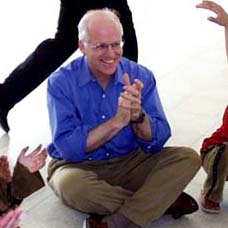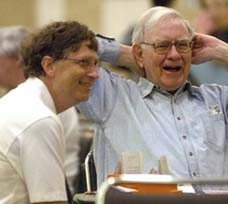2006.09.07: September 7, 2006: Headlines: COS - The Gambia: The Kansan: After more than a year of anticipation and a quick three-day preparation seminar that he and other Peace Corps volunteers attended in Philadelphia, Peter Granitz got his first glimpse of Gambia
Peace Corps Online:
Directory:
Gambia:
Peace Corps The Gambia :
The Peace Corps in the Gambia:
2006.09.07: September 7, 2006: Headlines: COS - The Gambia: The Kansan: After more than a year of anticipation and a quick three-day preparation seminar that he and other Peace Corps volunteers attended in Philadelphia, Peter Granitz got his first glimpse of Gambia
After more than a year of anticipation and a quick three-day preparation seminar that he and other Peace Corps volunteers attended in Philadelphia, Peter Granitz got his first glimpse of Gambia

On the dirt ground, in the middle of a grouping of huts, sit three large food-filled bowls that all of the villagers eat from. It’s not much, but what they do have they are willing to share. Granitz joins the village men who are squatting around the bowl designated for males. The second bowl is designated for women and the third, for children and elderly women. To eat from a bowl that is for women and children would be considered improper.
PCOL Comment: It's "the Gambia" not "Gambia." It's "Ukraine" not "the Ukraine." It's "Congo Kinshasa" not "Zaire." It's "Colombia" not "Columbia."
After more than a year of anticipation and a quick three-day preparation seminar that he and other Peace Corps volunteers attended in Philadelphia, Peter Granitz got his first glimpse of Gambia
It's a Different World
Former students find new lives as Peace Corps volunteers
By Stefanie Graves
Thursday, September 7, 2006
It’s seven o’clock in the evening, West African time, when Peter Granitz steps off a plane and is smacked by a wave of sweltering heat. He’s been awake for more than 24 hours now, and the mixture of sweat and exhaustion have stymied his emotions. His body moves methodically, following the other passengers off the plane and onto a rickety, overcrowded bus. There’s no need to stop at the luggage terminal before boarding; everything he’s brought with him fits into his framed backpack and tiny carry-on bag.
After more than a year of anticipation and a quick three-day preparation seminar that he and other Peace Corps volunteers attended in Philadelphia, Granitz gets his first glimpse of Gambia. A city of 1.5 million, Gambia has sub-tropical heat and two distinct seasons. It is located in West Africa, the smallest and most western country on the continent. Granitz will be the only American living in a remote village just outside of the city. He will call it home for the next two years of his life.
Grantitz, a 2005 graduate, is one of nearly 8,000 volunteers currently serving abroad as a member of the Peace Corps. The University of Kansas produces more volunteers than virtually any other university in the country, according to the Peace Corps organization.
[Excerpt]
Morning. Granitz awakes in his host family’s mud hut and swats at the bugs that are swarming above his head. He showers under a stream of cold water, then dresses in the dark. Hot water and electricity aren’t necessities in the village, and they are nowhere to be had. He doesn’t bother to eat the breakfast that his family has served — coos porridge with sour milk. He will find something on his own.
The hut and living conditions are up to US government standards, but Granitz has learned quickly that those standards don’t tend to be very high.
He spends most of his day talking with local farmers. His agricultural and forestry job with the Peace Corps has sent him to teach the people of West Africa techniques for generating profit through cultivation and farming. Recently, he’s been working on a project to create a new, more profitable strain of rice.
He’s his own boss. He reports his whereabouts to the Peace Corps office on Friday mornings. That’s it. Otherwise, he’s pretty much on his own. The job requires both patience and a strong work ethic.
Today, more than 182,000 volunteers have served in 138 countries, including parts of Africa, Asia, the Caribbean, Central and South America, Europe and the Middle East. When applying, applicants have an opportunity to preference in which area of the world they would like to live and on which of six assignments they most want to work. The assignments choices are education, health and HIV/AIDS awareness, business development, environment, agriculture and youth development.
Betty Baron, KU Peace Corps coordinator and former Volunteer, says that she interviews more than 150 potential applicants each year, of which about 30 percent will eventually become members. KU, she says, produces one of the highest number of volunteers each year.
In fact, the Peace Corps organization reported last year that 52 new volunteers were from KU.
The median age of a Peace Corps volunteer, or PC, as members tend to call themselves, is 25. Most have a college degree and more than 90 percent are unmarried, according to an informational flyer produced by the organization. Baron and many other regional Peace Corps recruiters are stationed at universities because they seem to be the best places to find potential PC volunteers.
Evening. A group of village children excitedly move to the pumping beats of the Outkast boys. Since Granitz’s arrival in the village, these impromptu dance parties have become a sort of tradition, and tonight the children are spellbound by the band’s fast-talking lyrics and by the other American rap and hip hop groups he plays.
Among the few personal belongings Granitz has managed to bring with him is an iPod. Nearly every day, he travels two miles to charge it using solar power at a fellow volunteer’s camp. It is inconvenient, sure, but it has proven to be a good investment.
Americanization
When Granitz travels to the nearby city of Gambia, West Africa’s largest metropolis, he encounters a completely different scene than what he sees daily in his village.
Young people have migrated to Gambia, many to become prostitutes in the country’s booming sex trade business. To these young Gambians, America remains a mystery. Most have never seen a picture of America, let alone met an American. Yet, young men walk around wearing reproduction NBA basketball jerseys and Nike tennis shoes. They listen to American hip hop music.
There are definite western influences in urban areas of the country he’s stationed, Granitz says. In the villages, people live off the land. They’re without most of the common luxuries that Americans and Europeans take for granted, like electricity, phones and hot water, he says. But in the city, you can see and feel the effects of western imports.
Most of the people living in the city are “about 10 years past the urban style and slang that we use in America, but they’re catching on,” he says. “Everyone asks if I’m from New York or LA. Do I know 50 Cent.”
It’s 9 p.m., dinner time in the small village where Granitz lives. He’s been in Gambia for several months now, and he knows what to expect on tonight’s menu — coos, a type of grain eaten morning, noon and night, with peanut sauce and tomatoes. Beans if he’s lucky.
On the dirt ground, in the middle of a grouping of huts, sit three large food-filled bowls that all of the villagers eat from. It’s not much, but what they do have they are willing to share. Granitz joins the village men who are squatting around the bowl designated for males. The second bowl is designated for women and the third, for children and elderly women. To eat from a bowl that is for women and children would be considered improper.
All of the men eat with their hands — their right hand. Because so much is done with your hands in West Africa, it is a courtesy to eat with your right hand and to reserve your left hand for other bodily functions. No one talks. No one drinks either. Water, customarily, isn’t drunk until the end of the meal because filling yourself with water seems silly when food here is so highly prized.
When this story was posted in September 2006, this was on the front page of PCOL:





Peace Corps Online The Independent News Forum serving Returned Peace Corps Volunteers
 | Chris Shays Shifts to Favor an Iraq Timetable
In a policy shift, RPCV Congressman Chris Shays, long a staunch advocate of the Bush administration's position in Iraq, is now proposing a timetable for a withdrawal of American troops. How Mr. Shays came to this change of heart is, he says, a matter of a newfound substantive belief that Iraqis need to be prodded into taking greater control of their own destiny under the country’s newly formed government. As Chairman of the House Government Reform subcommittee on national security, he plans to draft a timetable for a phased withdrawal and then push for its adoption. A conscientious objector during the Vietnam War who said that if drafted he would not serve, Chris Shays has made 14 trips to Iraq and was the first Congressman to enter the country after the war - against the wishes of the Department of Defense. |
 | Peace Corps' Screening and Medical Clearance
The purpose of Peace Corps' screening and medical clearance process is to ensure safe accommodation for applicants and minimize undue risk exposure for volunteers to allow PCVS to complete their service without compromising their entry health status. To further these goals, PCOL has obtained a copy of the Peace Corps Screening Guidelines Manual through the Freedom of Information Act (FOIA) and has posted it in the "Peace Corps Library." Applicants and Medical Professionals (especially those who have already served as volunteers) are urged to review the guidelines and leave their comments and suggestions. Then read the story of one RPCV's journey through medical screening and his suggestions for changes to the process. |
 | Gates charity races to spend billions
Warren E. Buffett’s gift of $31 billion to the Bill and Melinda Gates Foundation means that for tax reasons, starting in 2009, the foundation must distribute $3 billion annually, or a little more than twice what it distributed last year.
PCOL Comment: The Foundation says that "preventing the spread of HIV is the most durable long-term solution to the AIDS epidemic, and a top priority for the foundation." Peace Corps Volunteers and Returned Volunteers have been doing just that in AIDS Education for the past 15 years. Why not consider a $100M annual contribution to the Peace Corps to put 2,500 additional volunteers in the field to expand AIDS education worldwide? |
 | The Peace Corps is "fashionable" again
The LA Times says that "the Peace Corps is booming again and "It's hard to know exactly what's behind the resurgence." PCOL Comment: Since the founding of the Peace Corps 45 years ago, Americans have answered Kennedy's call: "Ask not what your country can do for you--ask what you can do for your country. My fellow citizens of the world: ask not what America will do for you, but what together we can do for the freedom of man." Over 182,000 have served. Another 200,000 have applied and been unable to serve because of lack of Congressional funding. The Peace Corps has never gone out of fashion. It's Congress that hasn't been keeping pace. |
 | Changing the Face of Hunger
In his new book, Former Congressman Tony Hall (RPCV Thailand) says humanitarian aid is the most potent weapon the United States can deploy against terrorism. An evangelical Christian, he is a big believer in faith-based organizations in the fight against hunger. Members of Congress have recently recommended that Hall be appointed special envoy to Sudan to focus on ending the genocide in Darfur. |
 | PC will not return to East Timor in 2006
Volunteers serving in East Timor have safely left the country as a result of the recent civil unrest and government instability. Latest: The Peace Corps has informed us that at this time, the Peace Corps has no plans to re-enter the country in 2006. The Peace Corps recently sent a letter offering eligible volunteers the opportunity to reinstate their service in another country. |
 | Chris Dodd considers run for the White House
Senator Chris Dodd plans to spend the next six to eight months raising money and reaching out to Democrats around the country to gauge his viability as a candidate. Just how far Dodd can go depends largely on his ability to reach Democrats looking for an alternative to Hillary Clinton. PCOL Comment: Dodd served as a Volunteer in the Dominican Republic and has been one of the strongest supporters of the Peace Corps in Congress. |
 | Peace Corps stonewalls on FOIA request
The Ashland Daily Tidings reports that Peace Corps has blocked their request for information on the Volkart case. "After the Tidings requested information pertaining to why Volkart was denied the position — on March 2 — the newspaper received a letter from the Peace Corps FOIA officer stating the requested information was protected under an exemption of the act." The Dayton Daily News had similar problems with FOIA requests for their award winning series on Volunteer Safety and Security. |
 | PCOL readership increases 100%
Monthly readership on "Peace Corps Online" has increased in the past twelve months to 350,000 visitors - over eleven thousand every day - a 100% increase since this time last year. Thanks again, RPCVs and Friends of the Peace Corps, for making PCOL your source of information for the Peace Corps community. And thanks for supporting the Peace Corps Library and History of the Peace Corps. Stay tuned, the best is yet to come. |
 | History of the Peace Corps
PCOL is proud to announce that Phase One of the "History of the Peace Corps" is now available online. This installment includes over 5,000 pages of primary source documents from the archives of the Peace Corps including every issue of "Peace Corps News," "Peace Corps Times," "Peace Corps Volunteer," "Action Update," and every annual report of the Peace Corps to Congress since 1961. "Ask Not" is an ongoing project. Read how you can help. |
 | RPCV admits to abuse while in Peace Corps
Timothy Ronald Obert has pleaded guilty to sexually abusing a minor in Costa Rica while serving there as a Peace Corps volunteer. "The Peace Corps has a zero tolerance policy for misconduct that violates the law or standards of conduct established by the Peace Corps," said Peace Corps Director Gaddi H. Vasquez. Could inadequate screening have been partly to blame? Mr. Obert's resume, which he had submitted to the Peace Corps in support of his application to become a Peace Corps Volunteer, showed that he had repeatedly sought and obtained positions working with underprivileged children. Read what RPCVs have to say about this case. |
 | Why blurring the lines puts PCVs in danger
When the National Call to Service legislation was amended to include Peace Corps in December of 2002, this country had not yet invaded Iraq and was not in prolonged military engagement in the Middle East, as it is now. Read the story of how one volunteer spent three years in captivity from 1976 to 1980 as the hostage of a insurrection group in Colombia in Joanne Marie Roll's op-ed on why this legislation may put soldier/PCVs in the same kind of danger. Latest: Read the ongoing dialog on the subject. |
Read the stories and leave your comments.

Some postings on Peace Corps Online are provided to the individual members of this group without permission of the copyright owner for the non-profit purposes of criticism, comment, education, scholarship, and research under the "Fair Use" provisions of U.S. Government copyright laws and they may not be distributed further without permission of the copyright owner. Peace Corps Online does not vouch for the accuracy of the content of the postings, which is the sole responsibility of the copyright holder.
Story Source: The Kansan
This story has been posted in the following forums: : Headlines; COS - The Gambia
PCOL34353
07
























